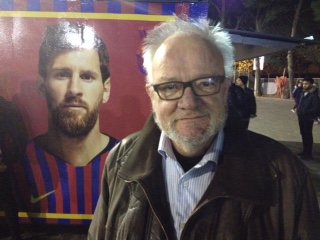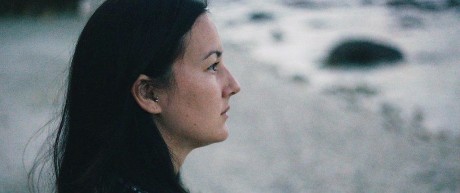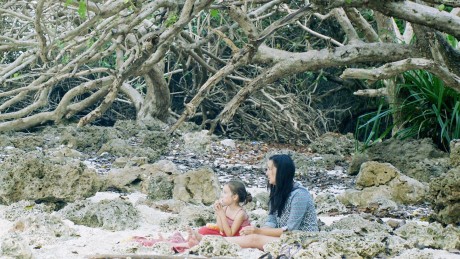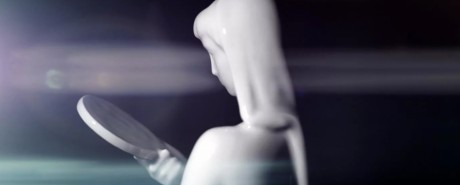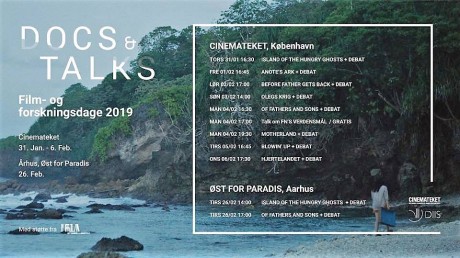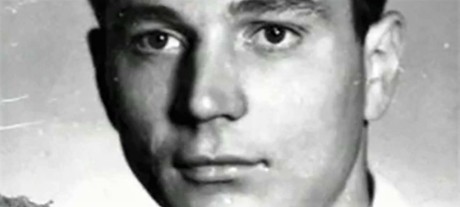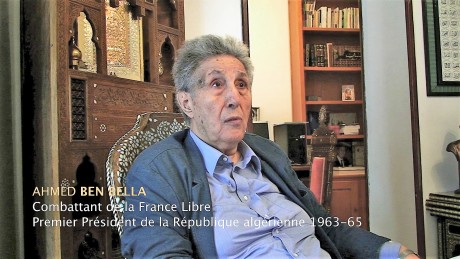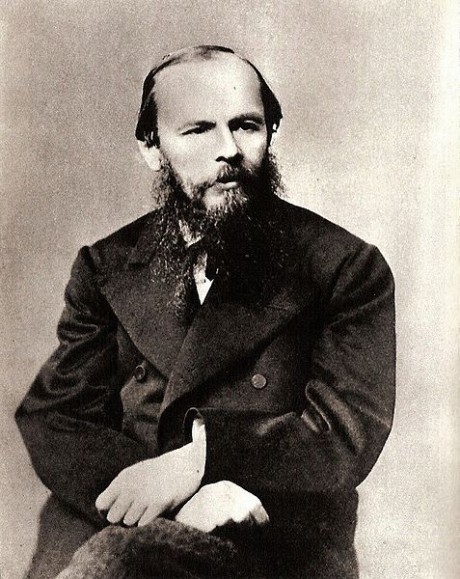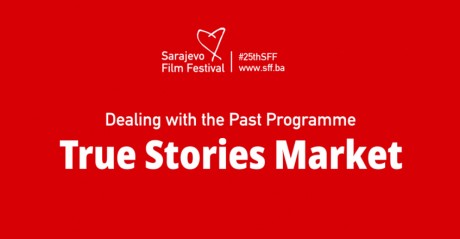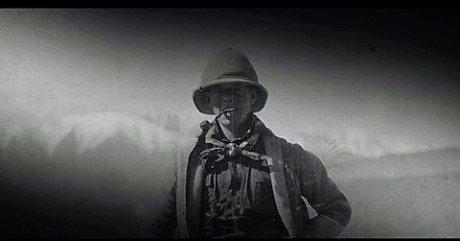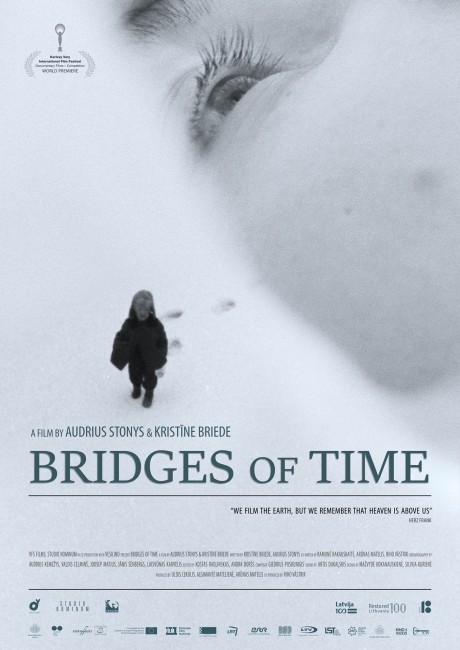THE DANISH INSTITUTE FOR INTERNATIONAL STUDIES (DIIS) AND CINEMATEKET PRESENT DOCS & TALKS – FILM AND RESEARCH DAYS, JANUARY 31st – FEBRUARY 6th, 2019
Daughters of foreign fighters from Georgia, flood-affected islanders in Kiribati and Australia’s hermetically sealed asylum centres. This year, we will once again travel far and wide at the third annual Docs & Talks film and research festival from January 31st to February 6th. The festival is organized by the Danish Institute for International Studies (DIIS) and Cinemateket.
With its combination of both proximity and a larger social perspective, documentary film is an ideal point of departure for research dissemination and debate. Docs & Talks offers a total of eight film events, in which researchers from DIIS and scholars from other leading international research institutes, filmmakers and practitioners discuss and put into perspective the different themes of the films – and we invite the audience to participate in the debate.
This year, three of the films will focus on the fate of children in war: in eastern Ukraine, we experience the war through the eyes of ten-year-old Oleg; in the Idlib province of Syria, al-Nusra fighters raise their sons to join the armed struggle in a society where violence is breeding violence; and in Georgia, two young teenage girls are deeply marked by the absence of their fathers, who have left to fight for the Islamic State.
Two films in the program touch upon the issues of poverty, health, inequality and climate change, and we host a special event where we scrutinize the visual narratives that dominate the development world and the communication of the UN Sustainable Development Goals (SDGs). Where nothing else is mentioned, the debates are in Danish.
Sara Thelle og Mira Bach Hansen / Forum for Film og Formidling
Anne Blaabjerg, Troels Jensen og Sine Plambech / DIIS
Rasmus Brendstrup, programredaktør / Cinemateket
https://www.diis.dk/en/trending-topic/docs-talks-film-and-research-days-2019
PROGRAMME
THURS 31/01 16:30
ASYLUM POLITICS / ISLAND OF THE HUNGRY GHOSTS
Gabrielle Brady, 2018 / Eng. subtitles / 94 min. / 145 min. incl. debate
We open the festival with Gabrielle Brady’s poetic and visually striking work on the nature of migration with the Australian asylum system as backdrop. The scenic and mysterious Christmas Island in the Indian Ocean is not just home of the red crab, which migrates by thousands from the jungle to the sea every year, and to a local population marked by Asian migrant culture. The island also houses one of three Australian detention centres where asylum seekers are detained and isolated indefinitely. Trauma therapist Poh Lin Lee tries to work with the detainees on their war traumas and the psychological consequences of their hopeless confinement – but her work is gradually becoming more difficult as the asylum seekers suddenly disappear without explanation from the authorities.
EVENT After the film, DIIS Senior Researcher Ninna Nyberg Sørensen and PhD Nikolas Feith Tan, researcher at the Danish Institute for Human Rights and Aarhus University, discuss asylum policies in Australia and Europe. The debate is in English.
FRI 01/02 16:45
CLIMATE CHANGE / ANOTE’S ARK
Matthieu Rytz, 2018 / Eng. subtitles / 77 min. / 140 min. incl. debate
Imagine if your home country was swallowed by the sea? The impacts of climate change threaten the small island nation of Kiribati with total obliteration, and the inhabitants must prepare for a future in climate exile. ‘Anote’s Ark’ follows both the relentless struggle of President Anote Tong to raise international awareness and to ensure the survival and cultural heritage of his countrymen, as well as the young mother Sermary, who literally fights against the rising water level while trying to reconcile herself to the idea of a new life in New Zealand. With ethnographic sensibility, Rytz has created a relevant and unsentimental story about the harsh consequences of the rising sea level for ordinary people.
EVENT How do we mitigate the consequences of the climate changes that we will have to live with and adapt to? This will be discussed by PhD Lily Lindegaard, who has researched climate adaptation and climate mobility in Vietnam, and former Emergency Managing Director of the UN in the Pacific, Sune Gudnitz. The debate is in English. Tickets: 95/65 kr.
SAT 02/02 17:00
RADICALIZATION / BEFORE FATHER GETS BACK
Sanam mama dabrundeba / Mari Gulbiani, 2018 / Eng. subtitles / 80 min. / 140 min. incl. debate
The Pankisi Valley in Georgia is notorious for being the breeding ground of a large number of radicalized Islamic State foreign fighters. In ‘Before Father Gets Back’, the camera is turned towards the society they departed from, giving us a rare insight into the life of the families left behind. The film is a touching coming-of-age story about the two young friends Iman and Eve whose lives are filled with so much more than the absence of their fathers.
EVENT Meet the director of the film, Mari Gulbiani, who has worked with adolescents of the region through various projects, and Maja Greenwood, who recently finished her PhD on foreign fighters. Together they will shed light on why men and women choose to go to war on behalf of Islamic groups in the Middle East and the consequences for the families they leave behind. The debate is in English. Tickets: 95/65 kr.
SUN 03/02 14:00
CHILDREN IN WAR / THE DISTANT BARKING OF DOGS
Olegs krig, Simon Lereng Wilmont, 2017 / English ssubt. / 90 min. / 145 min. incl. debate
[EVENT IN DANISH] Den prisbelønnede danske dokumentarfilm ‘The Distant Barking of Dogs’ tager os med til Ukraines frontlinje, hvor vi gennem 10-årige Olegs øjne bliver vidne til det uskyldstab, krigen gradvist påtvinger barnesindet. Instruktør Simon Lereng Wilmonts mesterligt fotograferede film portrætterer indlevende, hvor centrale de nære relationer er, når verden, som man kender den, udvikler sig til en krigszone, når naboerne flygter og alt, hvad der er velkendt og trygt, opløses omkring en.
EVENT Efter filmen perspektiverer seniorforsker på DIIS Johannes Lang i samtale med Mozhdeh Ghasemiyani, psykolog hos Læger uden Grænser, konsekvenserne af at vokse op og leve i en krigszone, og ikke mindst betydningen af de nære relationer, når krig bliver hverdag. Billetpris 95/65 kr.
MON 04/02 16:30
SYRIA / OF FATHERS AND SONS
Talal Derki, 2017 / Engl. subt. / 98 min. / 150 min. incl. debate
[EVENT IN DANISH] Den gribende og dybt foruroligende dokumentar ‘Of Fathers and Sons’ har vundet et utal af priser på filmfestivaler verden over det sidste år. Syriske Talal Derki (‘Return to Homs’) har på imponerende vis fået adgang til det intime familieliv blandt en gruppe al-Nusra-krigere i det nordlige Syrien. Instruktøren vender kameraet mod børnene, og filmen bliver til en hjerteskærende skildring af, hvordan den voldelige ideologi overleveres til den næste generation. Sønnerne vokser op i en verden, hvor brutaliteten siver ned i barnelivet og former dem til en fremtid som børnesoldater.
I den efterfølgende debat ser DIIS-forsker Tore Refslund Hamming m.fl. nærmere på de jihadistiske grupperinger i Syriens ideologiske grundlag, deres brug af vold og hvordan det påvirker individet, særligt den yngre generation. Billetpris 95/65 kr.
MON 04/02 17:00
DOCS & TALKS SPECIAL / UN GLOBAL GOALS: THE POWER OF IMAGES
Talk & debate / English / 90 min
With this special event, we look at the power of images in relation to the UN Sustainable Development Goals and development issues in general. How has poverty, inequality and other development topics been portrayed through images and films up until today – and what are the consequences of this visual representation?
DIIS researcher Adam Moe Fejerskov moderates the discussion spiced with case examples from the past up until today. Meet researcher Tobias Denskus from Malmö University, Danish development journalist Pernille Bærendtsen and BBC journalist Sammy Awami. The talk is in English. Admission is free, but reservations are required.
MON 04/02 19:30
POVERTY / MOTHERLAND
Bayang Ina Mo / Ramona S. Diaz, 2017 / Eng. subtitles / 94 min. / 150 min. incl. debate
With Ramona Diaz’s award-winning observational documentary, we find ourselves in the middle of the hustle and bustle of the world’s largest maternity clinic at the public Fabella Hospital in Manila, where poor women have to share the beds with each other. Personal stories are being told in between laughter and tears, screaming children, noisy loudspeakers and babies lost and found. The medical staff counselling on contraception and sterilization is met with scepticism in a society with strong catholic roots, and where young women often give birth to one child a year.
EVENT The film is followed by a discussion about reproductive health, inequality, poverty and sustainable development with DIIS Senior Researcher Helle Munk Ravnborg and Arthur Larok from ActionAid International. The debate is in English. Tickets: 95/65 kr.
TUES 05/02 16:45
TRAFFICKING / BLOWIN’ UP
Stephanie Wang-Breal, 2018 / Eng. subtitles / 98 min. / 150 min. incl. debate.
In Queens, New York, Judge Toko Serita is leading the first US Human Trafficking Intervention Court, a ground- breaking initiative to change the way women arrested for prostitution are prosecuted. The critically acclaimed documentary ‘Blowin’ Up’ brings us right into the turmoil of interpreters, lawyers and advisors inside and outside the courtroom and gives us a very close look at how the court works.
There is much at stake for the young women who have been arrested by the police on the street or in the many massage parlors of the city: in addition to a sentence, they often face problems with immigration authorities and risk deportation. With great insight and nuances, the film depicts how this profound change of the legal system affects the individuals involved, and what happens when prosecution and punishment are replaced with support and advice.
EVENT After the film, director Stephanie Wang-Breal, Maja Løvbjerg Hansen of the NGO The Danish Street Lawyers (Gadejuristen) and the leader of the NGO The Nest International (Reden), Kira West, will discuss the legal and social connections between migration, trafficking and sex work. DIIS senior researcher Sine Plambech moderates the debate in English. Tickets: 95/65 kr.
WED 06/02 17:30
RESEARCH & FILM / HEARTBOUND
Hjertelandet / Janus Metz, Sine Plambech, 2018 / 90 min. / 145 min. inkl. debat
[EVENT IN DANISH] Få et indblik i, hvordan antropologisk feltarbejde og migrationsforskning forvandles til en prisvindende dokumentarfilm. Gennem ti år har filmskaberne Janus Metz og DIIS-seniorforsker Sine Plambech fulgt en håndfuld familier, som gennem arrangerede ægteskaber binder to perifere områder i Danmark og Thailand tæt sammen. Det er blevet til filmen ‘Hjertelandet’, en alternativ kærligheds- og migrationshistorie. Filmen havde danmarkspremiere i efteråret 2018 og har siden rejst verden rundt på festivaler.
EVENT Se eller gense Hjertelandet og mød filmens hovedrolleindehaver Sommai Molbæk og antropolog Sine Plambech til en samtale om at lade sit liv og sine valg være omdrejningspunktet i en film og et forskningsprojekt – og om værdien af at lade sin historie fortælle til den brede befolkning. Billetpris 95/65 kr.
TICKETS
https://www.dfi.dk/cinemateket/biograf/filmserier/serie/docs-talks-2019
DIIS OG CINEMATEKET I PARADIS PRÆSENTERER
DOCS & TALKS AARHUS
FILM- OG FORSKNINGSDAG D. 26. FEBRUAR 2019
Dansk Institut for Internationale Studier (DIIS) og Cinemateket byder endnu en gang velkommen til DOCS & TALKS AARHUS – Film- og Forskningsdag tirsdag d. 26. februar i Øst for Paradis, hvor vi i år byder på to tankevækkende arrangementer, der kombinerer dokumentarfilm med forskningsformidling og debat.
Forskere fra DIIS vil sammen med kolleger fra bl.a. Aarhus Universitet diskutere og perspektivere filmenes temaer – og invitere publikum til at tage del i debatten.
Med DOCS & TALKS går vi endnu tættere på aktuelle begivenheder end i den daglige nyhedsstrøm, samtidig med at vi skildrer de grundlæggende politikker, ideologier og udviklingstendenser, der ligger bag. Festivalen løber af stablen i Cinemateket i København d. 31. januar. til 6. februar og i Aarhus d. 26. februar. Tanken med Docs & Talks er at formidle viden på en anderledes og spændende måde til et bredt publikum – og at gøre båndet mellem film og forskning stærkere. Vi glæder os til at byde et spørge- og diskussionslystent publikum velkommen!
TIR 26/02 14:00
ASYLPOLITIK / ISLAND OF THE HUNGRY GHOSTS
INSTRUKTØR: GABRIELLE BRADY / 150 min. inkl. debat
Gabrielle Bradys poetiske og visuelt slående værk om migrationens væsen har den australske asyllovgivning som baggrund. Den på én gang naturskønne og sælsomme ø Christmas Island i det Indiske Ocean er ikke bare hjemsted for den røde krabbe, der hvert år migrerer i tusindtal fra junglen til havet, og for en lokalbefolkning præget af asiatisk migrantkultur. Øen huser også en af de tre australske lejre, hvor asylansøgere tilbageholdes og isoleres på ubestemt tid. Traumeterapeuten Poh Lin Lee forsøger at få migranterne til at bearbejde deres krigstraumer og konsekvenserne af den udsigtsløse indespærring – men hendes arbejde bliver gradvist sværere at udføre, fordi asylansøgerne pludselig forsvinder uden forklaring fra myndighederne.
Efter filmen vil DIIS-seniorforsker Ninna Nyberg Sørensen og Ph.d. Nikolas Feith Tan, der forsker i Australiens asylsystem ved Institut for Menneskerettigheder og Aarhus Universitet, diskutere asylforhold i Australien og Europa. Debatten foregår på engelsk.
AUSTRALIEN, TYSKLAND, UK, 2018. DCP FARVE. 94 MIN. ENGELSKE UNDERTEKSTER. TILLADT OVER 15 ÅR. ENTRE 80 KR.
TIRS 26/02 17:00
SYRIEN / OF FATHERS AND SONS
INSTRUKTØR: TALAL DERKI / 160 min. inkl. debat
Den gribende og dybt foruroligende dokumentar ‘Of Fathers and Sons’ har vundet et utal af priser på filmfestivaler verden over det sidste år. Syriske Talal Derki (‘Return to Homs’) har på imponerende vis fået adgang til det intime familieliv blandt en gruppe syriske al-Nusra-krigere i det nordlige Syrien. Instruktøren vender kameraet mod børnene, og filmen bliver til en hjerteskærende skildring af, hvordan den voldelige ideologi overleveres til den næste generation. Sønnerne vokser op i en verden, hvor brutaliteten siver ned i barnelivet og former dem til en fremtid som børnesoldater.
I den efterfølgende debat ser DIIS-forsker Tore Refslund Hamming m.fl. nærmere på de jihadistiske grupperinger i Syriens ideologiske grundlag, deres brug af vold og hvordan det påvirker individet, særligt den yngre generation.
TYSKLAND, SYRIEN, 2017. DCP FARVE. 98 MIN. ENGELSKE UNDERTEKSTER. TILLADT OVER 15 ÅR. ENTRE 80 KR.
BILLETTER
https://www.paradisbio.dk/MovieDetails.aspx?movieId=10524
(Island of the Hungry Ghosts)
https://www.paradisbio.dk/MovieDetails.aspx?movieId=10525
(Of Fathers and Sons)



